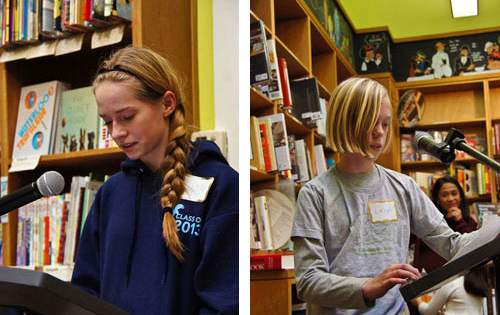Stories of Tomorrow: How Writing a Book Can Be a Life-Changing Moment

(Above: Participants in the Young Writers Program at a reading at a bookstore in Berkeley.)
Tomorrow’s stories start in all sorts of places: on the drive to work, or at the movie theater. One constant source of inspiration? The classrooms that tackle NaNoWriMo through our Young Writers Program. YWP educator Christina Brodersen tells us how writing and publishing a book can be a life-changing moment for her students:
I’d love to take full credit for initiating the Young Writers Program at Zurich International School (ZIS) but the reality is that in 2010, a year before I started, a small group of Grade 5 children had participated in YWP with another teacher.
I was thrilled when I realised that the school had not only tried YWP out but found it too valuable to drop again. Don’t get me wrong, it’s not like writing isn’t already supported at our school: they teach creative writing from kindergarten. But because it’s part of the school curriculum, writing is assigned within a pre-set structure and with a specific purpose, e.g. writing about a school trip in the past tense, or making sure you cover five activities.
With YWP, the students are allowed to write freely, telling their story without having to worry about anything but telling it well, their choice of subject, genre, story arc, and culmination. And we as mentors simply do what we can to guide, encourage and motivate them to see it through to the end.
The brilliance of YWP is the virtual classrooms. We inform everybody of what’s going on, put up motivational links to things like the pep talks, keep track of everybody’s progress, have the kids sign up as each other’s writing buddies (though they really need no prompting from us in that respect—some of them found that feature before we did!), and wage Word Wars with other groups of young writers.
It’s a lovely, flexible structure that creates a sense of community. And because we’re an international school with a substantial number of expats and families staying in Switzerland between 1 to 5 years, we can use the virtual classroom to stay in touch with students who left ZIS but still want to participate in NaNoWriMo if the school they go (back) to doesn’t run YWP.
We quite like the workbook, too. We always ask the kids to fill out the character sheets and story roller coaster in October and encourage them to look in the workbook during November if they need to remind themselves where they wanted to take the story or if they need inspiration for plot development or dialogue. We use other materials for teaching creative writing to the group too, but the workbook is usually the first thing we hand out.
What I like best about YWP and NaNoWriMo in general, though, is the focus on writing without editing, being creative without being critical and allowing yourself to go on an adventure with your characters without questioning if it’s “good enough.” At least for the first draft.
However, accepting the “you cannot delete anything” rule is just as big a challenge for them as it is to get enough words stuck together to meet their word-count goals because they’re so critical of themselves. So we tell them that if they write something in November that’s so offensive to their sensibilities that they can’t stand looking at it they can move it to the very bottom of the document but it stays in and it’s counted. Even if they think it’s the worst thing ever written, it stays. And more often than not, when they go back to something they thought stank worse than a skunk knee-deep in raw sewage it turns out to be not only tolerable but actually quite good. Sometimes great. And if they listened to their inner editors and deleted it, they would never have that experience.
They spend two months editing, revising and rewriting after November but it’s such a valuable experience for them to spend an entire month basically saying “yes, and” rather than “no, but.”
The first year I ran YWP at ZIS everybody had to set their word count goal before November 1st and it couldn’t be changed during November. That created a slight sense of panic (read: full-blown hysterical paranoia) because we had to get everything up and running, make sure every student had created an account and changed the word count goal from the default 50,000 to a more manageable one. Our participants are 9, 10 or 11 years old so just navigating successfully through the sign-up process is quite an achievement.
All through November we were nervously monitoring the students’ writing progress because we weren’t actually sure how a group of ten-year-olds would react to a month’s relentless writing. They all fought and wrote and won, and we celebrated with a cupcake party in the beginning of December.
It’s a great relief that the word-count goal is no longer locked, and I’m a much less anxious person during set-up in October. We have actually utilised this new feature to better motivate the writers who take off like a rocket and hit their word-count goal within ten days by having them increase their goal to still have something to challenge themselves with for the rest of the month. This is particularly useful when they later get stuck with their stories; rather than just having them lean back and saying “Well, I don’t have to write any more,” they still have to produce words every day to make it like everybody else. They all progress differently as writers, and being able to change the word-count goal supports taking a differentiated approach to their writing like every other aspect of their learning.
Other than that, I think the biggest obstacle was actually figuring out what to do after November. Now, we take them through a two month revising and editing process with mini-lessons once or twice a week to turn their November creation into an actual, readable story with a beginning, middle, and an end. And we equip them with a very detailed walk-through of how to use CreateSpace to publish and spend a full month formatting their stories, creating their covers and finally sending it off to be published. During this final month I will meet with the authors individually 1-3 times to help them with the problems they encounter. And that’s had an amazing impact; the past two years, every single student who started YWP in November has gone on to publish their books in February.
The imagination of the kids never ceases to amaze me. Every year I think I’ve heard it all but I quickly realise I haven’t when they start telling me about their stories involving secret agent ostriches or hamsters, Nobel Prize winning freedom fighters, the secret lives of shirts, or a school for cheesepuffs. Epic adventures with aliens, monsters, fairies, elves and… killer peacocks. Warm, deep and sometimes sad books about friendship. You name it, we’ve got it. And then some.
I’m insanely proud of each and every one of the students who have chosen to take the YWP challenge and I feel ridiculously privileged to have been allowed to go on this journey with them. Some fly and some crawl, some have to fight harder than others, some need to be pushed harder than others but they all reach the finishing line, not only in November but even more so when they stand on stage on Book Day at school, showing their brand new, printed paperback book to the world, the story they wrote.
The look of pride on their faces when they receive the NaNoWriMo certificates from the principal and read from their books to an audience of equally proud parents, teachers and admiring younger students is just amazing.
And sometimes I don’t even realise how much of an impact participating in this project has made in their lives until a parent visits the library and tells me how they’ve watched their child grow with the task, becoming more confident with each word written and emerging triumphantly on the other side an author. Having accomplished something that will stay with them forever. Something they with absolute certainty knew in November they couldn’t.
Those are the times I can’t help crying.
There are very few events in our lives that we, when we look back, recognise as pivotal and life-changing. Writing a story in a month and turning it into a published book will for some of these kids be such a moment.
I don’t think it gets much better that that.

Christina Brodersen has a PhD in Computer Science and has worked as an Assistant Professor, an Innovation Consultant and a User Experience Researcher. But she happily traded all that in for the glamourous role of Library Assistant at Zürich International School. She spends her days helping students discover the magic of reading great stories. She’s originally from Denmark but has for the past 6 years been enjoying the mountains and chocolate (and mountains of chocolate!) of Switzerland with her two kids and husband. She loves to write but can’t bear to show it to anybody because her inner editor rules the creative kingdom of her mind with an iron fist. And a mallet. And possibly nuclear weapons.
Chris Baty's Blog
- Chris Baty's profile
- 63 followers



